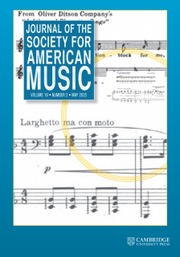No CrossRef data available.
Article contents
Blackface Minstrelsy and the Reception of Elizabeth Taylor Greenfield
Published online by Cambridge University Press: 08 September 2021
Abstract
This article explores blackface minstrelsy in the context of Elizabeth Taylor Greenfield's singing career of the 1850s–1870s. Although Greenfield performed a version of African American musicality that was distinct from minstrel caricatures, minstrelsy nonetheless impacted her reception. The ubiquity of minstrel tropes greatly influenced audience perceptions of Greenfield's creative and powerful transgressions of expected race and gender roles, as well as the alignment of race with mid-nineteenth-century notions of social class. Minstrel caricatures and stereotypes appeared in both praise and ridicule of Greenfield's performances from her debut onward, and after successful US and transatlantic tours established her notoriety, minstrel companies actually began staging parody versions of Greenfield, using her sobriquet, “Black Swan.” These “Black Swan” acts are evidence that Greenfield's achievements were perceived as threats to established social hierarchies.
- Type
- Research Article
- Information
- Copyright
- Copyright © The Author(s), 2021. Published by Cambridge University Press on behalf of the Society for American Music


